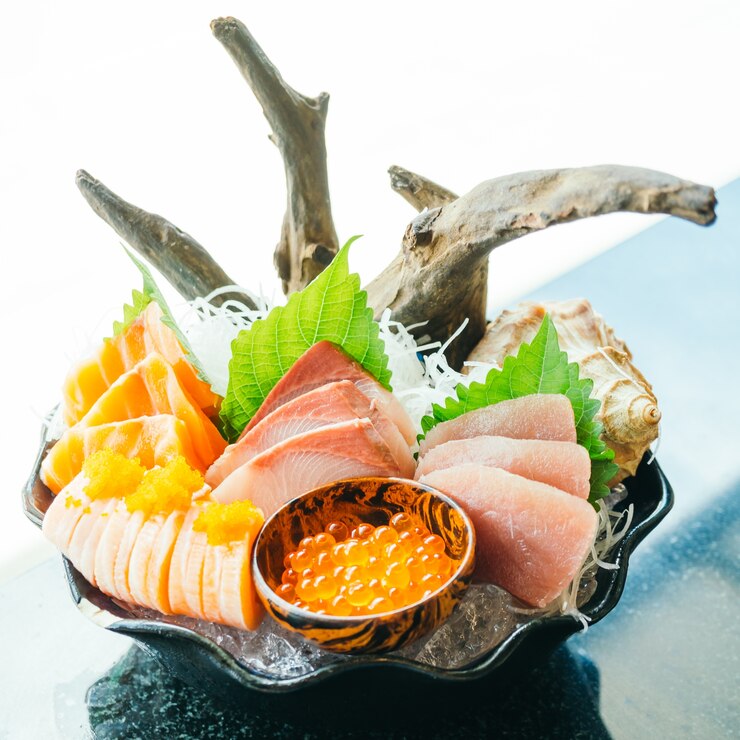
Sashimi is a Japanese dish of thinly sliced raw fish or seafood. It is considered a delicacy and is often served on special occasions. Sashimi is typically served with soy sauce, wasabi, and pickled ginger. It can also be served with other condiments, such as ponzu sauce or yuzu kosho.
Sashimi is a popular dish all over the world, but it is especially popular in Japan and other Asian countries. It is also becoming increasingly popular in Western countries.
What is Sashimi?
Sashimi is a Japanese dish of thinly sliced raw fish or seafood. It is typically made with fish high in fat and flavor, such as tuna, salmon, yellowtail, and mahi mahi. Sashimi can also be made with shellfish, such as shrimp, scallops, and squid.
The fish is filleted to make Sashimi and then cut into thin slices. The slices should be thin enough to be eaten easily but not so thin that they fall apart. Sashimi is typically served cold but can also be served at room temperature.
History Of Sashimi
The question that keeps floating in the mind of the food pundits is: what is the origin of Sashimi? There is not much constructive evidence regarding the source of the delicacy. But if we simply consider the etymology of the word, we would find out that the meaning of the word is pierced body. It has undoubtedly entered into the Japanese food culture and went on to become a part of the Japanese food culture.
The fish one harvest, especially for the ikejime method, There is another theory on the origin of the food. It tells that the name emerged from a sunomono dish called namasu. It is cooked with the uncooked vegetables or the seafood. Presently, there are over 4000 sushi restaurants running in the whole of USA. Now, these are huge figures, to say the least.
How to Eat Sashimi

Sashimi is typically eaten with soy sauce, wasabi, and pickled ginger. The soy sauce enhances the fish’s flavour, while the wasabi and pickled ginger cleanse the palate between bites.
To eat Sashimi, simply dip a slice of fish in soy sauce and then top it with a small amount of wasabi. You can also add a piece of pickled ginger to your bite.
Different Types of Sashimi
There are many different types of Sashimi, each with a unique flavor and texture. Some of the most popular types of Sashimi include:
- Tuna (maguro): Tuna is a popular choice for Sashimi because it is flavorful and has a rich texture.
- Salmon (sake): Salmon is another popular choice for Sashimi because it is fatty and has a buttery flavor.
- Yellowtail (hamachi): Yellowtail is a mild-flavored fish with a slightly sweet taste.
- Mahi Mahi (dorado): Mahi Mahi is a firm-fleshed fish with a slightly sweet flavor.
- Shrimp (Ebi): Shrimp is a popular choice for Sashimi because it is sweet and has a delicate flavor.
- Scallops (rotate): Scallops are a popular choice for Sashimi because they are sweet and have a soft, buttery texture.
- Squid (ika): Squid is a popular choice for Sashimi because it is firm and has a slightly chewy texture.
How to Prepare Sashimi
If you are preparing Sashimi at home, using fresh, high-quality fish is important. The fish should be sashimi-grade, which means it has been frozen to a temperature that kills parasites.
To prepare Sashimi, first fillet the fish. Then, cut the fish into thin slices. The slices should be thin enough to be eaten easily but not so thin that they fall apart.
Once the fish has been sliced, serve it immediately with soy sauce, wasabi, and pickled ginger.
Related: Magnet Fishing Tips for Beginners
Traditional Preparation Of Sashimi
Firstly, one has to cut Sashimi into pieces. Yes, you may question the exact cuts that are meant for this dish. The clear cut that generally suits the particular dish is Hira Zukuri. It is generally a cut of a particular size, specifically a rectangular one. People typically use this cut for the preparation of fish like the Kingfish and Tuna. One can also use traditional cuts like zukuri. It is one cut that is very thin. Other than this you can also use it like the Kaku zukuri, which means the cubed slices. Yes, the cuts of the fish is one of the crucial element of teh entire preparation.
Serving
Once the fish is cut and the meal is prepared, it is usually served as the first course of the traditional Japanese meal. Remember, Sashimi is typically one preparation that is garnished with white Radish and diakon. They add extra flavors and enhance the taste of the food.
The most brilliant part of the dish is that Sashimi is considered an art in the Japanese culture and not just food. There are few cultures in the art where food transcends the periphery of taste and flavors and enters the borders of aesthetics. This very dish is undoubtedly one of them. One must appreciate the culinary culture that Japanese food has held for quite a long time. Sashimi is without doubt, best in terms of its mass appeal.
Tips for Enjoying Sashimi

Here are a few tips for enjoying Sashimi:
- Use fresh, high-quality fish.
- Cut the fish into thin slices.
- Serve the Sashimi immediately.
- Use soy sauce, wasabi, and pickled ginger to enhance the flavour of the fish.
- Eat the Sashimi in small bites.
Where to Buy Sashimi
Sashimi can be purchased at most Japanese restaurants and sushi bars. It can also be purchased at some high-end grocery stores.
When choosing Sashimi, it is important to select fresh fish with a bright color. The fish should also be firm and have a slightly translucent appearance.
Conclusion
Sashimi is a delicious and healthy dish that is perfect for any occasion. It is a great way to enjoy the fresh flavor of fish and seafood. If you have never tried Sashimi before, I encourage you to try it. You may be surprised at how much you enjoy it.
Read Also:




























